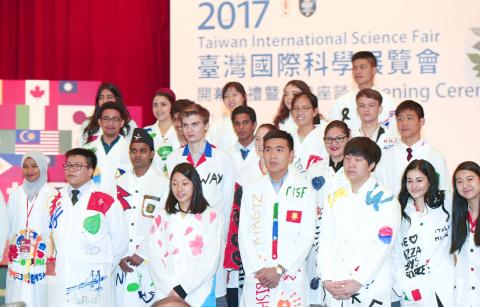Students from 23 nations and territories — a record for the event — yesterday convened at the National Taiwan Science Education Center in Taipei for the final stage of this year’s Taiwan International Science Fair.
A total of 221 high-school and junior-high school students — 53 of whom are Taiwanese — made it into the final from a preliminary contest last month.
The finalists submitted a total of 40 works in categories including mathematics, chemistry, physics, astronomy, geography, environmental science, zoology, botany, microbiology, biochemistry, medicine, engineering, computer science, information, information engineering and environmental engineering and behavioral and social sciences.

Photo: Chang Chia-ming, Taipei Times
The competition — started in 1992 as a contest for junior-high and elementary schools from nations in the Asia-Pacific region — was upgraded in 2002 when it attained its current title and started receiving entries from students around the world.
To bolster high-school students’ understanding of science, the ministry has revised high-school curriculum guidelines for next year to require students to engage in scientific projects and perform experiments in a bid to help them put theory into practice, Deputy Minister of Education Lin Teng-chiao (林騰蛟) said.
Academia Sinica president James Liao (廖俊智) gave a speech at the ceremony in which he detailed the potential for and challenges involved with the development of eco-friendly technologies that promote sustainability.
Prize-winning Taiwanese students would likely have the opportunity to compete in international science fairs, such as the US’ International Science and Engineering Fair, with the results scheduled to be announced on Friday, the education center said.
The overseas participants are from Belgium, Switzerland, Norway, Italy, Canada, New Zealand, Russia, Japan, South Korea, Singapore, Malaysia, the Philippines, Thailand, Mexico, Nepal, Turkey, Saudi Arabia, South Africa, Tunisia, Kyrgyzstan, Hong Kong and Macau.

Chinese spouse and influencer Guan Guan’s (關關) residency permit has been revoked for repeatedly posting pro-China videos that threaten national security, the National Immigration Agency confirmed today. Guan Guan has said many controversial statements in her videos posted to Douyin (抖音), including “the red flag will soon be painted all over Taiwan” and “Taiwan is an inseparable part of China,” and expressing hope for expedited reunification. The agency last year received multiple reports alleging that Guan Guan had advocated for armed reunification. After verifying the reports, the agency last month issued a notice requiring her to appear and explain her actions. Guan

GIVE AND TAKE: Blood demand continues to rise each year, while fewer young donors are available due to the nation’s falling birthrate, a doctor said Blood donors can redeem points earned from donations to obtain limited edition Formosan black bear travel mugs, the Kaohsiung Blood Center said yesterday, as it announced a goal of stocking 20,000 units of blood prior to the Lunar New Year. The last month of the lunar year is National Blood Donation Month, when local centers seek to stockpile blood for use during the Lunar New Year holiday. The blood demand in southern Taiwan — including Tainan and Kaohsiung, as well as Chiayi, Pingtung, Penghu and Taitung counties — is about 2,000 units per day, the center said. The donation campaign aims to boost

The Kaohsiung Tourism Bureau audited six hotels in an effort to prevent price gouging ahead of Korean band BTS’ concert tour in the city scheduled for Nov. 19, 21 and 22 this year. The bureau on Friday said that the audits — conducted in response to allegations of unfair pricing posted on social media — found no wrongdoing. These establishments included the local branches of Chateau de Chine, Hotel Nikko, My Humble House, and Grand Hai Lai, it said, adding that the Consumer Protection Commission would have penalized price gougers had the accusations been substantiated. The bureau said the Tourism Development Act

The military yesterday said it has located the flight data recorder, or black box, of an F-16V jet that disappeared off eastern Taiwan earlier this month, and it would soon deploy a salvage team to try to retrieve it. Air Force Command Headquarters said that while it had pinned down the location of the black box, it was still searching for the aircraft’s sole pilot, air force Captain Hsin Po-yi (辛柏毅). Without providing details, the air force said it had located the black box days after detecting some intermittent signals and would now engage a team of professionals to retrieve it. The air